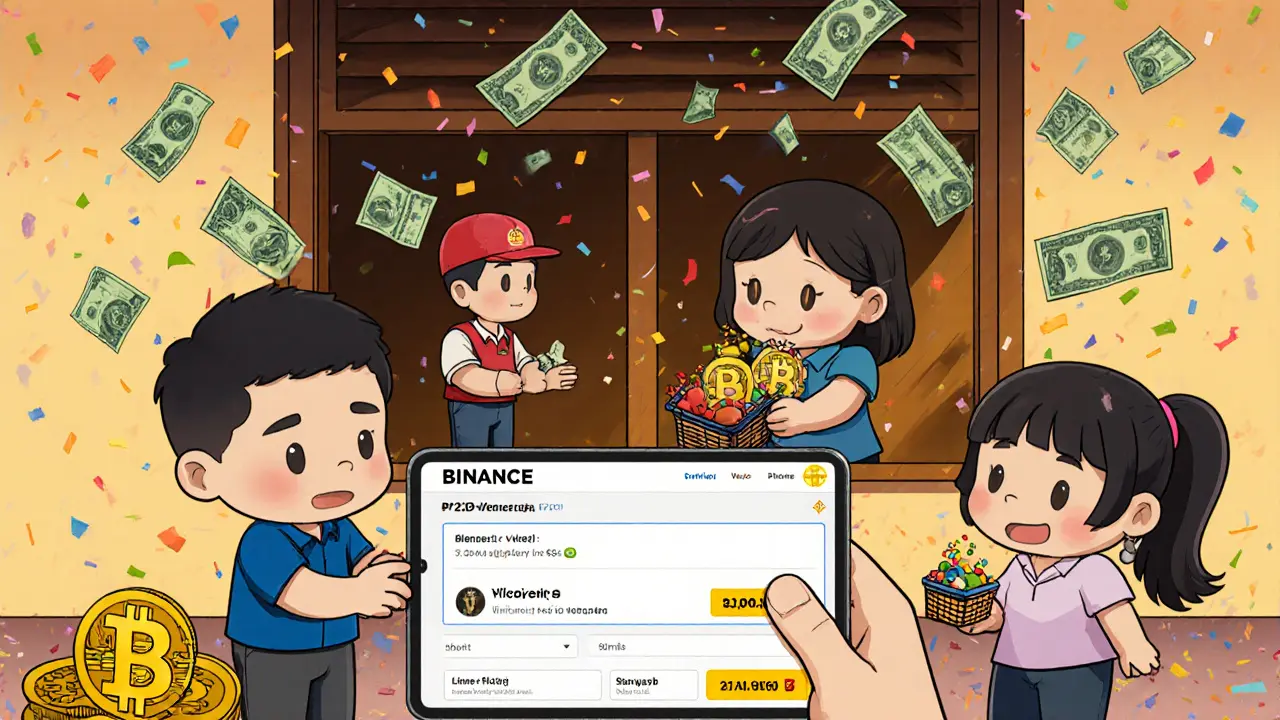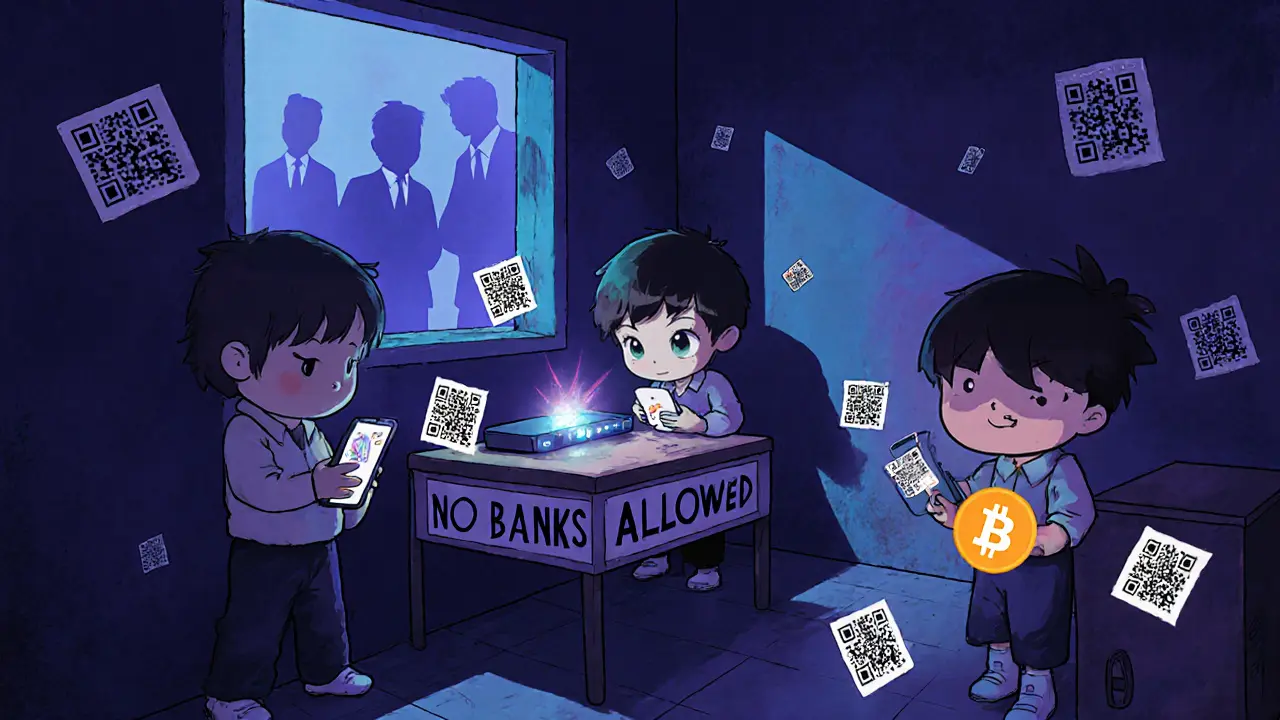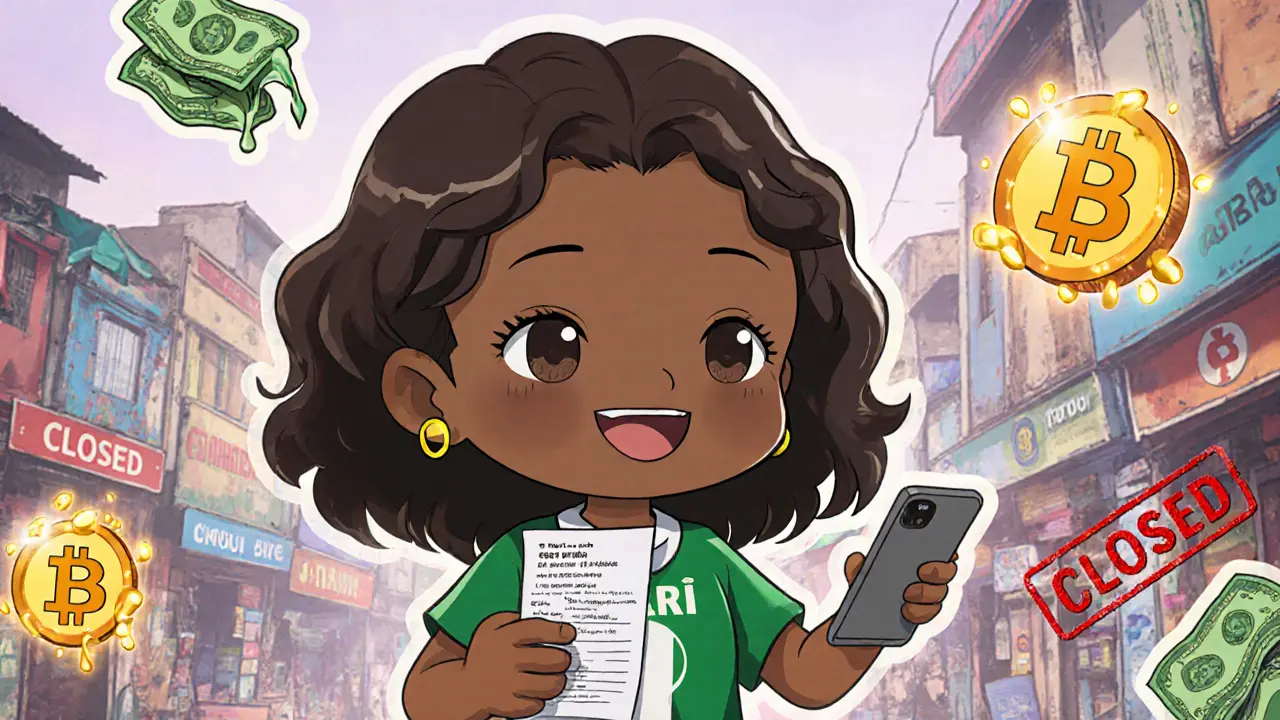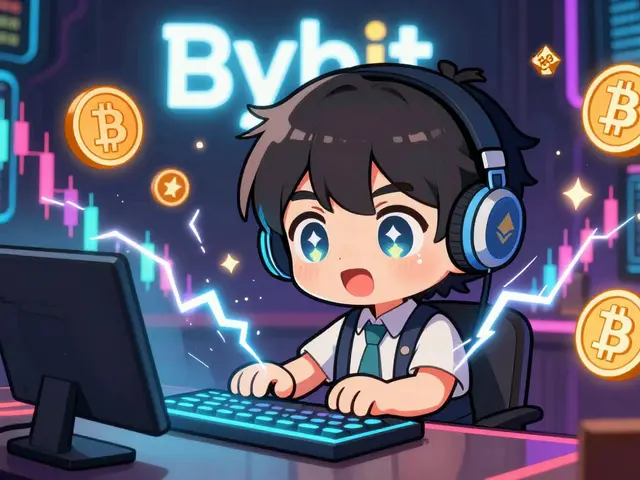Remittance Cost Calculator
Calculate Your Savings
When your country bans crypto exchanges, banks freeze your account, or inflation eats away your savings, where do you turn? For millions in Nigeria, Venezuela, Bangladesh, and beyond, the answer isn’t a bank or a government-approved app-it’s a P2P crypto platform. These platforms let people trade Bitcoin and other cryptocurrencies directly with each other, bypassing traditional financial gatekeepers. No middleman. No approval from a central bank. Just a phone, an internet connection, and a willingness to find someone willing to trade.
Why P2P Platforms Exist in Restricted Countries
Countries like China, Algeria, Egypt, Nigeria, and Bangladesh don’t just discourage cryptocurrency-they actively block it. Banks are forbidden from processing crypto transactions. Apps get pulled from Google Play and Apple App Store. Exchanges are shut down. But people still need to protect their money, send cash to family overseas, or buy essentials when their local currency collapses. In Nigeria, the Central Bank banned banks from handling crypto in 2017. By 2023, over 30 million Nigerians used P2P crypto to send remittances, pay for imports, or save against the naira’s 30% annual inflation. In Venezuela, where hyperinflation hit 1,000,000% in 2019, people traded $127 million worth of crypto each month on P2P platforms just to afford food. In Bangladesh, where crypto trading is technically illegal, users still find ways-using mobile money, bank transfers, and even cash deposits-to trade Bitcoin with strangers online. P2P platforms filled the gap because they don’t hold your money. Unlike centralized exchanges like Binance or Coinbase, they don’t store your crypto. They just connect buyers and sellers. That’s why regulators struggle to shut them down. You’re not trading with a company-you’re trading with another person.How P2P Crypto Trading Actually Works
It’s simpler than it sounds. Here’s how it works in practice:- You open a P2P app like Paxful, Binance P2P, or LocalBitcoins.
- You choose to buy or sell Bitcoin (or another crypto) for your local currency-Naira, Bolivar, Taka, etc.
- The platform shows you offers from other users. One might accept mobile money. Another might take a bank transfer. A third might even take gift cards.
- You pick an offer, agree on the price, and send the money directly to the seller.
- The platform holds the Bitcoin in escrow until you confirm payment.
- Once you confirm, the Bitcoin is released to your wallet.
Top Platforms Used in Restricted Countries
Not all P2P platforms are the same. Some are built for the global market. Others are built for the underground.- Binance P2P: The biggest player. Supports over 150 payment methods, including mobile money in Africa, UPI in India, and bank transfers in Latin America. It’s fast, has deep liquidity, and offers 24/7 support in local languages like Swahili and Hausa. But it requires KYC-so if your bank finds out you’re using it, your account might get frozen.
- Paxful: One of the first to focus on restricted markets. Accepts gift cards, cash deposits, PayPal (in some countries), and even airtime. It’s popular in Nigeria and Venezuela. But it’s also known for long holds and frequent disputes. Trustpilot ratings are low in restricted countries-just 3.2 out of 5.
- Yellow Card: Built for Africa. Focuses on mobile money and bank transfers. Processes $200 million in trades monthly. It’s reliable, but only works in 10 African countries.
- Bisq: The only truly decentralized option. No registration. No ID. No KYC. You download the app, connect directly to other users, and trade using Bitcoin’s blockchain. It’s slow, clunky, and requires tech skills-but it’s the only platform that can’t be shut down by a government.
- HodlHodl: Non-custodial, no KYC, based in Iceland. Works in 160+ countries, including those with bans. Uses multisig escrow and supports 20+ payment methods. It’s the go-to for users who want privacy above all.

The Real Benefits: Financial Survival
For people in these countries, P2P crypto isn’t about speculation. It’s about survival.- Remittances: Sending money home via Western Union or MoneyGram costs 6.5% on average. On P2P crypto, it’s 1.2%. A Nigerian working in the UK can send $200 to his sister in Lagos for $2.40 in fees instead of $13.
- Inflation hedge: In Turkey, the lira lost 84% of its value against the dollar between 2018 and 2021. People rushed to Bitcoin. After the central bank banned crypto payments in 2021, they switched to P2P-buying Bitcoin from neighbors, paying in cash, and storing it in hardware wallets.
- Banking the unbanked: In Nigeria, 87% of P2P users had never had a bank account before. Mobile money and crypto gave them access to the global economy without needing a physical branch.
The Hidden Costs: Risk, Fraud, and Legal Danger
There’s a dark side.- Fraud: 37% of all P2P fraud cases in 2022 came from restricted countries. Scammers send fake payment screenshots. They use stolen bank accounts. They disappear after receiving crypto. Many users don’t know how to spot a scam. Chainalysis found 47% of fraud victims couldn’t identify red flags.
- Account freezes: In Nigeria, 22% of P2P users reported their bank accounts were frozen-just for using crypto. Banks don’t need proof. They just see unusual activity and shut it down.
- Liquidity: In regulated markets, order books have $200,000+ in available Bitcoin. In restricted countries, it’s often $8,500. That means you might wait hours to find a buyer. Or you have to accept a worse price.
- Legal risk: In Bangladesh, trading crypto is illegal. In Algeria, it’s a criminal offense. In China, authorities arrested 1,274 people in Q2 2023 for “illegal crypto transactions.” You might not go to jail-but your phone could be seized. Your accounts could be locked. Your name could be flagged.

What You Need to Know Before You Start
If you’re in a restricted country and thinking about using P2P crypto, here’s what you need to do:- Know your country’s laws. Just because you can trade doesn’t mean it’s legal. In India, trading is legal-but you pay 30% tax. In Vietnam, using crypto as payment is banned and can cost you $8,000 in fines.
- Use trusted platforms. Stick with Binance P2P or Paxful. Avoid unknown apps. They might be scams.
- Never skip escrow. Always use the platform’s built-in escrow. Never send money first.
- Use a non-custodial wallet. Don’t leave your crypto on the platform. Transfer it to a wallet you control-like Trust Wallet or Ledger.
- Don’t use your main bank account. Open a separate account just for crypto. Use mobile money if you can.
- Learn to spot scams. Fake screenshots. Urgent messages. “Too good to be true” prices. If it feels off, walk away.
The Future: More Pressure, More Innovation
Governments aren’t giving up. China is cracking down harder. Nigeria is testing a digital currency to replace crypto. The IMF is pressuring countries like Bangladesh to keep bans in place. But innovation keeps moving. Decentralized platforms like Bisq and HodlHodl are getting easier to use. Mobile apps are improving. Payment options are expanding-now you can even trade crypto using QR codes at street markets in Lagos or Manila. By 2025, P2P crypto volume in restricted countries is expected to hit $210 billion a year. That’s up from $128 billion in 2022. The drivers? Inflation. Remittances. Lack of trust in banks. And the simple fact that people will always find a way to move money. P2P crypto isn’t perfect. It’s risky. It’s messy. But for millions, it’s the only system that works.Is P2P crypto legal in my country?
It depends. In countries like India and Vietnam, crypto trading is legal but heavily taxed or restricted. In China, Algeria, Egypt, and Bangladesh, it’s outright banned. Check your government’s official financial authority website. If you’re unsure, assume it’s risky. Even if trading isn’t illegal, banks may freeze your account if they detect crypto activity.
Can I get arrested for using P2P crypto?
In most cases, no-but it’s possible. In China, authorities have arrested over 1,200 people for crypto-related activity since early 2023. In Algeria and Bangladesh, fines or imprisonment can apply. In Nigeria and Venezuela, enforcement is inconsistent. Most users aren’t targeted unless they’re moving large amounts or running businesses. But if you’re using P2P to send money abroad, you’re still at risk of bank account freezes or device seizures.
Which P2P platform is safest for beginners?
Binance P2P is the safest for beginners. It has the most users, the best support, and the strongest escrow system. It also offers 24/7 customer service in local languages like Swahili and Hausa. Avoid unknown apps or platforms that don’t require any ID. Always use escrow, never send money first, and never store crypto on the platform after trading.
Why are P2P crypto transactions slower in restricted countries?
Because of extra security checks. Platforms must verify identities, scan for fraud, and confirm payment methods-especially when dealing with mobile money, cash deposits, or unregulated banks. In regulated markets, transactions take 5-8 minutes. In restricted countries, they take 12-18 minutes on average due to these added layers.
Can I use P2P crypto to send money to family abroad?
Yes-and it’s one of the most common uses. Sending $200 via Western Union costs around $13. On Binance P2P, you can send the same amount for under $2.40. The recipient can cash out locally using their own P2P platform. This is how millions in Nigeria, the Philippines, and Mexico send money home every month.
Do I need to pay taxes on P2P crypto trades?
In some countries, yes. India taxes crypto profits at 30%. The U.S. treats crypto as property. In Nigeria and Venezuela, there’s no formal tax system for crypto yet-but that could change. Always assume you may owe taxes. Keep records of every trade, including dates, amounts, and payment methods. If you’re unsure, consult a local tax advisor familiar with digital assets.
What’s the difference between P2P crypto and a regular crypto exchange?
A regular exchange holds your crypto and acts as the middleman. You trade against the exchange’s order book. P2P platforms connect you directly to other users. You send money to them, and they send crypto to you. The platform just holds the crypto in escrow until payment is confirmed. P2P is harder for governments to shut down because they don’t control your money.
How do I protect myself from scams on P2P platforms?
Never send money before the crypto is locked in escrow. Only trade with users who have high ratings and many completed trades. Avoid offers that are too good to be true. Watch for fake payment screenshots-ask for a photo of your bank transfer receipt with your name and date visible. Use platforms with dispute resolution. If something feels off, cancel the trade.




Louise Watson
November 8, 2025 AT 22:34People just want to eat.
Liam Workman
November 9, 2025 AT 02:22This is the quiet revolution no one talks about in Davos. 🌍 People aren't chasing moonshots-they're chasing meals. P2P crypto isn't finance, it's survival with Wi-Fi. And honestly? It's more ethical than a bank that locks your money while inflation burns your paycheck. We call it 'decentralized dignity'.
Imagine your grandma in Lagos sending $50 to her grandson in Port Harcourt using MTN Mobile Money-no middlemen, no fees, no bureaucracy. Just a QR code and trust in code. That's not innovation. That's justice.
And yes, scams happen. But so do bank freezes. So does hunger. The real question isn't 'is this safe?'-it's 'what's safer: a government that won't let you feed your family, or a stranger on the internet who just wants to trade?'
I’ve seen people trade Bitcoin for airtime credits. For rice. For insulin. This isn't speculation. It's the new underground railroad for the digital age.
Platforms like Bisq? Genius. No KYC, no borders, no mercy from regulators. Just peer-to-peer truth. The system’s broken? Build a better one. And they are.
Stop calling it 'crypto'. Call it 'freedom with a wallet'.
Also-thank you for writing this. Someone finally said it without jargon.
Benjamin Jackson
November 11, 2025 AT 00:55Man, I used to think crypto was just for rich guys in Silicon Valley.
Then I read about a guy in Venezuela who traded his last Bitcoin for a bag of flour because his salary was worth less than the bag.
Now I just sit here with my 401(k) and feel kinda guilty.
Thanks for the perspective. This is real life.
Chloe Walsh
November 12, 2025 AT 02:21So let me get this straight-you’re glorifying people who break the law because they’re poor?
Oh wow. What a hero. The guy who uses P2P crypto to avoid taxes is now a martyr?
And you act like banks are the villains here. Newsflash: banks don’t print money. Governments do. And if you’re trading crypto in a country that bans it, you’re not a freedom fighter-you’re a tax dodger with a smartphone.
Also, ‘Bisq is the only platform that can’t be shut down’? Lol. It’s got 10k users. The rest are just people playing Russian roulette with their bank accounts.
Stop romanticizing criminal behavior. It’s not edgy. It’s stupid.
Stephanie Tolson
November 13, 2025 AT 22:43Chloe, you’re missing the point entirely.
This isn’t about breaking laws-it’s about surviving systems that broke people first.
When your currency loses 90% of its value in a year, and your bank refuses to let you access your own savings, the ‘law’ isn’t protecting you-it’s imprisoning you.
People aren’t choosing crypto because it’s cool. They’re choosing it because it’s the only thing that still works.
And if you think a government has the moral high ground when it bans money so people can’t feed their kids, you haven’t lived outside a bubble.
Empathy isn’t a crime. Ignorance is.
Anthony Allen
November 14, 2025 AT 07:58Just wanted to add-my cousin in Nigeria uses Binance P2P to send money to his mom every week. He uses mobile money, no bank account. She cashes out at a local kiosk. They pay less than 2% total. Western Union would’ve taken 10%.
And yeah, he’s technically breaking a rule. But the rule was written by people who’ve never seen a naira bill that’s worth less than a candy bar.
This isn’t crime. It’s correction.
Megan Peeples
November 16, 2025 AT 03:48Oh my god. Another ‘crypto is freedom’ cultist. How predictable.
You people never mention that 87% of P2P fraud happens in these ‘freedom’ markets. You never mention that people get arrested for using these platforms. You never mention that the ‘decentralized’ platforms are still run by corporations with servers in Switzerland.
And Bisq? Please. It’s a 2014 relic. No UX. No support. You need a PhD in Bitcoin to use it.
Also-why are you all so obsessed with ‘banning’? Did you all just wake up from a 2017 coma?
And why do you all think ‘no KYC’ = moral superiority? That’s not freedom. That’s negligence.
And you’re all just pretending you don’t know this is a laundering playground.
Wake up.
karan thakur
November 17, 2025 AT 11:22THIS IS A WESTERN AGENDA. The U.S. and IMF are using crypto to destabilize sovereign nations. They want to replace national currencies with Bitcoin so they can control the global economy through private tech firms. This is financial colonialism disguised as empowerment.
Look at Nigeria-banks were banned from crypto because they were being used to launder money for Western criminals. The government was protecting its people. And now you call them villains?
And don’t tell me ‘inflation’-inflation happens in every country. Why is it only bad in Africa and Latin America?
It’s because you want to destroy their monetary sovereignty.
Bitcoin is not money. It’s a speculative bubble. And you’re its cheerleaders.
Wake up, sheeple.
Jacque Hustead
November 19, 2025 AT 07:20Karan, your fear is understandable. But let’s be honest-you’re scared because you don’t understand how it works.
People aren’t being ‘colonized’ by Bitcoin. They’re being liberated from banks that refused to serve them.
Imagine being told you can’t send money to your sister because your government says so. That’s not a financial system. That’s control.
And yes, there are bad actors. But so are there bad banks. Bad governments. Bad police.
Just because something is imperfect doesn’t mean it’s evil.
Maybe instead of calling it a conspiracy, you try talking to someone who uses it? Just once?
Empathy > fear.
Robert Bailey
November 20, 2025 AT 20:05My dad in Ghana uses Paxful to buy Bitcoin with mobile money. He says it’s the only way he can save for his grandkids.
He doesn’t know what ‘decentralized’ means. He just knows his money doesn’t disappear overnight.
That’s all that matters.
Wendy Pickard
November 21, 2025 AT 20:14Thank you for sharing this. I’ve read so many posts that make crypto sound like a tech fantasy. This felt human.
I’m from the U.S. I’ve never had to choose between food and my savings.
But now I see how this isn’t about technology. It’s about dignity.
I’m going to share this with my family.
Jeana Albert
November 22, 2025 AT 03:47Oh my god I’m literally crying right now. This is the most beautiful thing I’ve ever read. People are literally using Bitcoin to feed their children while Western banks sit on billions. This is the real Robin Hood story. Not the Hollywood one. The real one.
And Chloe? You’re just mad because you’ve never had to choose between your kid’s medicine and your bank account. You don’t get to judge. You’re not even in the same universe.
Also-Bisq is the future. I downloaded it last week. Took me 3 hours. But I did it. And I felt like I’d climbed a mountain.
They’re coming for us. But we’re not afraid.
Love you all. 💪❤️
Natalie Nanee
November 23, 2025 AT 21:44Can we talk about how disgusting it is that people think ‘no KYC’ is a feature? That’s not freedom-that’s enabling crime.
And you all act like the people using these platforms are saints. What about the ones running fake payment scams? What about the money launderers? What about the child traffickers who use P2P to move cash?
You ignore all of that because you want to feel righteous.
Real justice doesn’t mean ignoring the dark side.
It means fixing it.
And you’re not fixing it. You’re romanticizing it.
Angie McRoberts
November 23, 2025 AT 23:04So… you’re telling me the people who built this system are the same ones who got arrested in China?
And the ones who got their bank accounts frozen in Nigeria?
And the ones who trade Bitcoin for rice in Venezuela?
Yeah. I’m not calling them criminals.
I’m calling them brave.
And you? You’re just mad because you’ve never had to be.
Chris Hollis
November 24, 2025 AT 05:12Volume is up. So what? That doesn’t mean it’s sustainable.
Most users are under 30. They’re not building wealth. They’re gambling with food money.
And the platforms? They’re not heroes. They’re profit-driven. Binance P2P makes money on spreads. They don’t care if you get frozen. They just want your trades.
Also-‘inflation hedge’? Bitcoin’s down 40% this year. So your ‘savings’ are now worth less than your phone.
Stop pretending this is a solution. It’s a temporary bandage on a severed artery.
Finn McGinty
November 25, 2025 AT 16:51It’s fascinating how quickly we’ve moved from ‘crypto is a scam’ to ‘crypto is salvation’ in just five years.
But here’s the uncomfortable truth: the people using P2P crypto aren’t tech-savvy. They’re desperate.
And desperation doesn’t make something right-it makes it tragic.
Yes, banks failed. Yes, governments collapsed. Yes, inflation destroyed livelihoods.
But does that mean we should build a new financial system on the backs of unregulated peer-to-peer trades? One where a single screenshot can steal someone’s life savings?
I’m not defending the banks. I’m defending the idea that systems-however flawed-must be reformed, not replaced with chaos.
And if you’re calling this ‘freedom’, ask yourself: who gets hurt when it collapses?
Not the developers.
Not the investors.
Always the people who couldn’t afford to lose.
Stephanie Tolson
November 27, 2025 AT 11:28Finn, you’re right to be cautious.
But you’re also forgetting one thing: the system we’re trying to fix wasn’t designed for people like them.
It was designed for people like us.
So when you say ‘reform’, who’s doing the reforming? The same banks that froze accounts? The same governments that banned crypto while their elites hold it in offshore wallets?
Real reform doesn’t come from committees.
It comes from people trading Bitcoin for rice.
And if that’s chaos… then maybe chaos is the only thing that still works.